Conceived of and opened in the mid-1960s, the Center originally sought to enable women to attend the University of Michigan while assisting the University in making itself welcoming to returning women students. The Center’s work was based on a fundamental understanding that women had a wide range of life experiences, with work and family roles intertwined in ways that made a woman’s life course different from that of a man. At the center of this work were the lives of individuals. Assisting women one at a time grew into a counseling program with an integrated focus on all aspects of life, a variety of programmatic offerings to address common concerns, and a recognition that the work to be done may often lie with the system, not the individual.
Over five decades, the Center changed in size, emphasis, and programming. Yet it remained consistent in its commitment to encouraging and enabling women to access education, to seek adequate and fulfilling employment, and to acknowledge and balance the multiple aspects of their complex lives. Responding to a changing society and an ever-changing campus administration, the Center and its leaders skillfully maintained their place at the University.
A Matter of Fairness: A History of the Center for the Education of Women at the University of Michigan was written by former CEW+ Director of Information Services & Publications, Jeanne E. Miller. Publication of the book was made possible in part thanks to sponsorship by the Bentley Historical Library. A Matter of Fairness is available at the Center; contact [email protected] for more information or to get a copy.
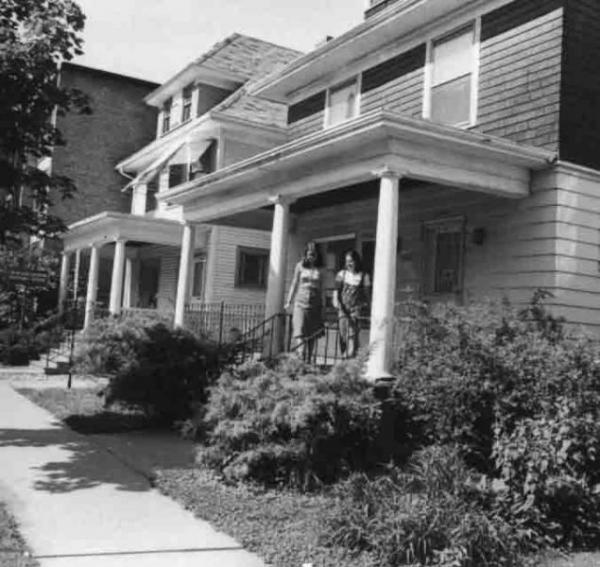
(Above) The first CEW house, located at 330 Thompson St, was in use from 1967 to 1981. The Center opened its doors September 1, 1964, in a two-room space in the Michigan League. Only three years they were able to move to the 330 Thomson St. building, tripling their space. In its first long-term assessment of its work, published in 1978, the Center could report that the number of full-and part- time staff had grown to seventeen and its offices had again expanded to a house next door at 328 Thompson St.
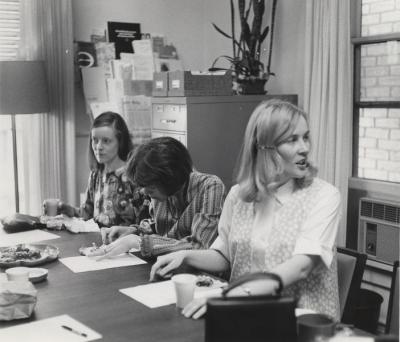
(Left) An early CEW-sponsored discussion group, designed along the support-group model for current issues of interest to women. Such groups provide peer support and also allowed the staff to assist more individuals using fewer hours of counseling. The center offered space for women to discuss specific topics such as working mothers, alternative careers for teachers, or balancing school and family. “Groups for black women” also emerged as the first efforts to address the unique concerns of women of color.
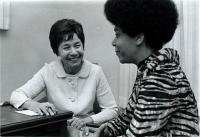
(Right) CEW founder Jean Campbell conducting an interview in 1970. The Center was founded in 1964 and Jean Campbell was the first director until she retired in 1985. She had led the Center through its self-creation in the beginning years and overseen its development as a functional and respected unit. Campbell was instrumental in molding the Center into a place that addressed the needs of individuals, provided new knowledge about women’s lives through its research, and represented the needs of women across the University to its executive officers.
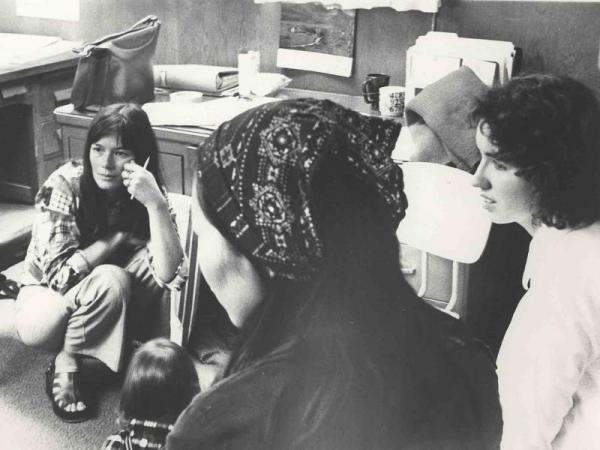
(Above) A counselor from the early 1970s helping to shape the future of the Center through short term counseling and a recognition of the multiple demands in women’s lives. In the early years of the Center, academics and student-services professionals had little understanding of how the course of a woman’s life and her development as an adult differed from a man’s. As these individuals consistently presented similar concerns – a lack of financial aid for part-time students, for example – it became clear that those concerns represented broader policy issues that needed to be addressed, such as the development of financial aid resources for part-time students.
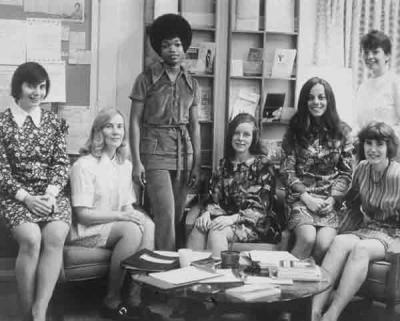
(Left) Group of early CEW scholars. The CEW scholarship program began in 1969, moving to a formal program of awards with a single selection process. Within the first year or two of the Center’s existence, the staff had identified the inability of returning female students to obtain financial aid as one of the institutional barriers facing these women. CEW+ now awards more than 100 scholarships per year to students with less traditional, less represented, and therefore under-resourced backgrounds.
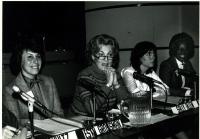
(Right) Panel from the 1981 Issues for Women in Science Conference. The Women in Science Program (WIS) was created in 1980 to recruit women into the sciences and help the University understand why women were underrepresented in the sciences. In the early 1990s, WIS evolved into Women in Science and Engineering (WISE). In 1999, WISE left the Center and grew into its own separate program.
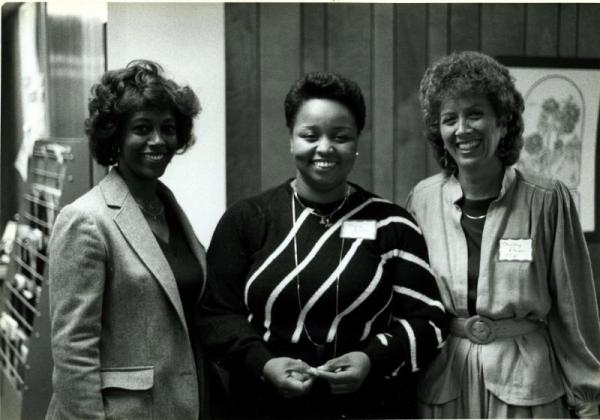
(Above) 1982 Interns. As early as 1972, CEW served as a training setting for students. The first interns were U-M Social Work students, but over the years, counseling interns also came from other colleges across the east side of Michigan. CEW also offered an Administrative Internship Program from 1977-1999, which helped women prepare to return to the labor force or enter for the first time.
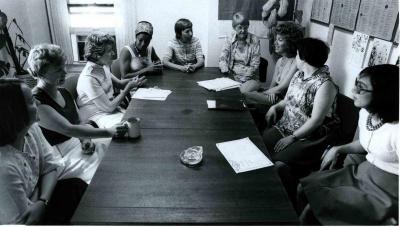
(Left) An early CEW staff meeting in the library of the original house at 330 Thompson St. The Ford Foundation provided funds to help expand the Center’s library to include materials to support the research component of the Center’s work. By 1974, the Center was publishing edited volumes of research on women, and Center staff were presenting research findings and program examples through conferences, publications, and Center-published papers.
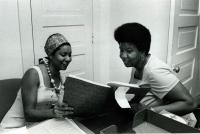
(Right) Francelle Kirkling (L) with a participant. Kirkling was hired by the Center in 1974 to help address the unique needs of black women. The demographics of this group differed from those of white participants. Between 1976 and 1981, the Center offered four conferences devoted to the concerns of African-American women. The first, coordinated by Kirkling, was attended by 250 participants who participated in workshops on topics ranging from “Black Women: Our Bodies, Ourselves” to “Black Women in Professional Work Roles.”
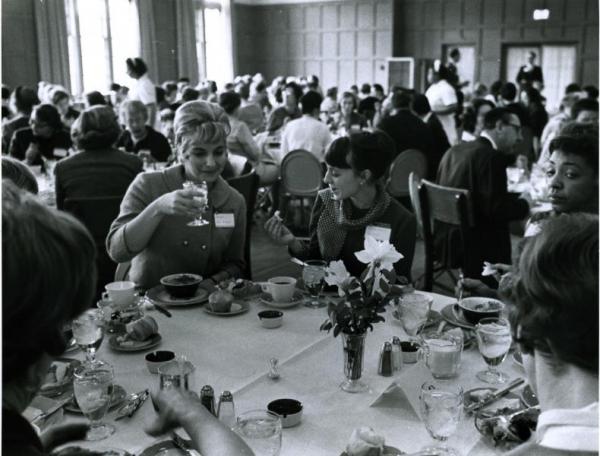
(Above) Luncheon at the first conference in 1965. This conference, entitled “Opportunities for Women through Education,” offered sessions on the career paths and required education for a range of fields. The conference model was a huge success; about 240 women attended, and more than 350 had to be turned away.
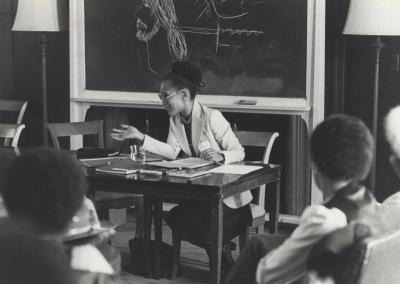
(Left) Speaker at one of the “Black Women in Transition” Conferences. Between 1976 and 1981, CEW offered four conferences devoted to the concerns of African-American women. These conferences worked to address concerns, raise awareness, and propose solutions about the concerns of black women in the community.
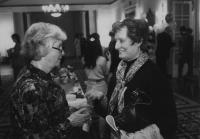
(Right) Jean Manis (L) and Myra Fabian (R). Manis co-led the Ford study that surveyed women who had used the Center between 1964 and 1973. In 1977, the Ford Foundation awarded a $100,000 development grant to the Center to fund a study on the transition from education to employment as well as to use as seed money that the Center could make available to outside researchers who were studying women’s lives.
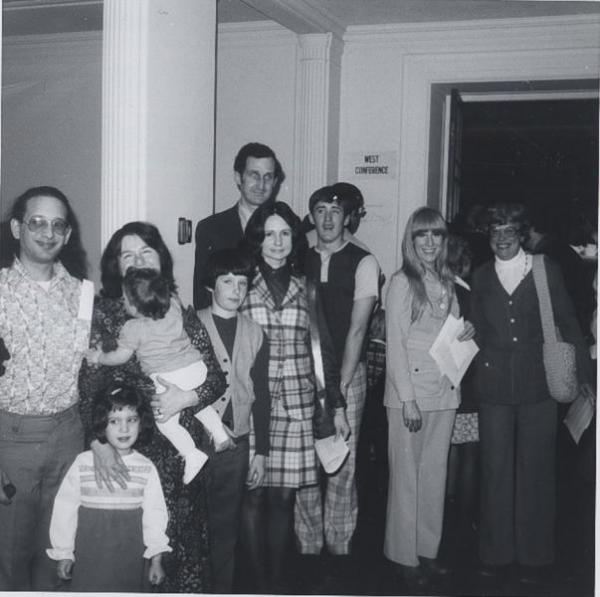
(Above) C. 1973 Scholars with their families. In 1969, the Center announced a scholarship program for returning women students. While the Center had already functioned as the awarding unit for individual scholarships from various women’s organizations, the Scholarship Program established a formal program of awards with a single selection process and quickly became one of the Center’s signature features.
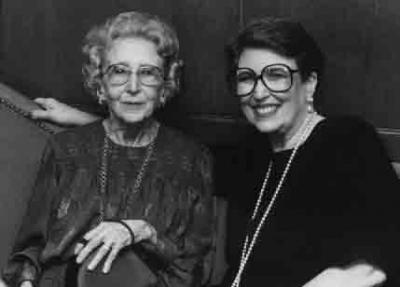
(Left) Margaret Dow Towsley (L) was instrumental in funding and perpetuating the CEW Scholarship Program. She provided $25,000 annually for the program, and in 199,0 her daughters Margaret (Ranny) Riecker (R) and Judy Dow Rumelhart approved a $1 million endowment from the Margaret and Harry Towsley Foundation that ensured the continuation of the Margaret Dow Towsley Scholarship, and thus the CEW Scholarship Program.
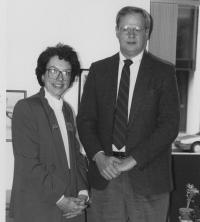
(Right) Carol Hollenshead became the director of CEW in 1988, ready to work on developing the Center on three levels: “the individual, the institutional, and the societal.” Hollenshead gave 20 years to CEW before retiring, feeling accomplished about all that the Center had achieved. In 1994, Jim Duderstadt worked with CEW to develop and implement the “Michigan Agenda for Women: Leadership for a New Century.” The goal of the Agenda was to promote “the success of women of diverse backgrounds.”
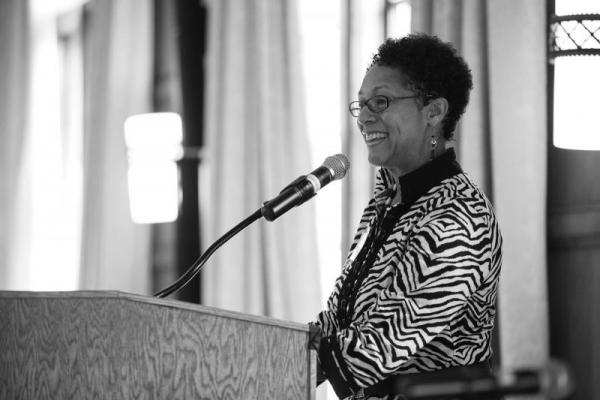
(Above) Dr. Gloria Thomas began her tenure as the Center’s Director in 2009. Thomas is steering the Center in the direction of increased integration into the fabric of the institution as well as the fabric of the community. Whether increasing on-campus collaborations or outreach to community members, the Center’s current focus is to continue its record of excellence while involving more partners in the process. Thomas indicates that she doesn’t see a diminished need for the Center “until policies in the U.S. are implemented to aid all women to achieve equity between women and men in pursuing education and careers, along with maintaining family caregiving responsibilities.”

